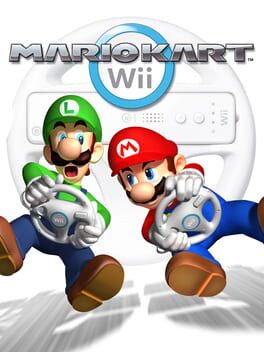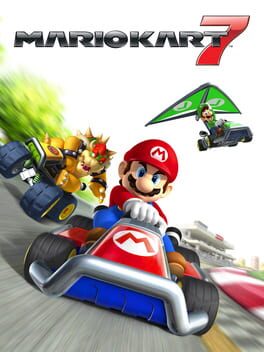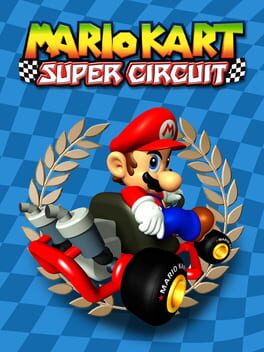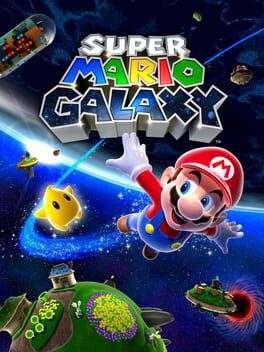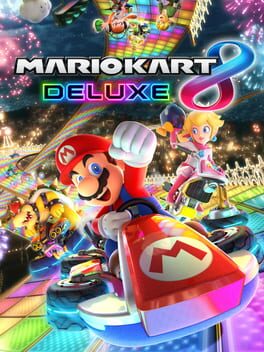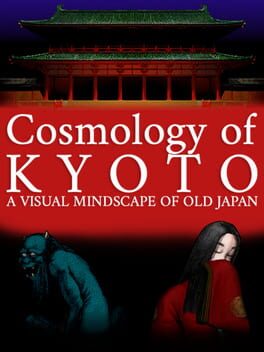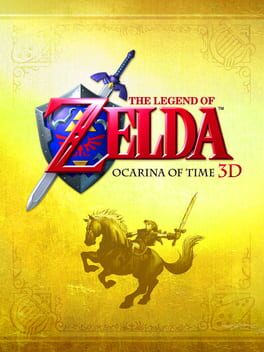Stabbed
2008
Unless 8 blows me away, this is the best one, for sure. All 16 new courses are all fantastic, not a single dull moment among the bunch, and the retro tracks aren't snoozers, either. The trick system is, of course, brilliant, combined with the focus on drifting thanks to the easier controls and new bikes, and you've got one of the most consistently fun games I can think of. Anyone who writes the praise for this game off as nostalgia is being intentionally pig-headed, you can feel how great this is as soon as you start your first race. The only Mario Kart game so far where I've actively wanted to unlock everything manually, rather than begrudgingly acquiescing or just cheating it in. Absolutely deserves the hype.
2011
This is the MK game I played the most when I was younger, so maybe I'm just really familiar with it, but I still have no clue why this one gets so shafted by fans as much as I see it does. The glider sections are a great addition, the loss of bikes is sad but they're replaced with maps that have a heavy focus on huge drifts, and the maps are all pretty good. The new maps are mostly solid, maybe the best Rainbow Road in the series, but there are a couple bland ones; none explicitly bad, though. As everyone else has said, the major highlight of the game is its fantastic retro courses. Overall, just a very consistently "good" game. No soaring highs (like Wii's) nor crushing lows, but just really good throughout.
I didn't think I'd rank this below Super, but at least that game had charm, this one doesn't even have that. The AI doesn't blatantly cheat like in that game, but my god are these levels the worst the series has to offer. When they aren't painfully simple, they feel deliberately annoying and hard to see because of the GBA's extremely limited screen space. Very little that I like in this, but I'll give the game some credit and say the terrible controls and slidiness might've been because I was playing Bowser. I don't care enough to check how the other racers play.
All the comments talking about how much this game falls to pieces in the third act were not joking, man. I already wasn't completely on board with this like most other people (mainly because I found the movement to be very slow and constantly bogged down), but I liked it well enough and loved the Raimi/Hooper inspiration in the first act. The horror wore off on me quick, but still had some good scares throughout, enough to not feel bored. Of course, again, this all goes to pot once the second act closes. You can feel how forced the third act is, to the point where you could sum everything that happens in it up with a document. The drawn-out unskippable cutscenes and repetitive videotape sections throughout the game (but especially near the end) aren't great, either.
I haven't played the DLCs yet, maybe they'll enhance some of the game for me, but this was honestly a letdown for how much it had been hyped. The first act was gold, second act was pretty good, third act was a total bomb that kinda soured the whole experience for me. Not a bad game at all; hell, the characters here are some of my favorites in the series (save for the bland-ass protagonist), but it's not one I could see myself coming back to too often, and if I do, it'll be after I learn some speedrun strats for the last couple sections.
I haven't played the DLCs yet, maybe they'll enhance some of the game for me, but this was honestly a letdown for how much it had been hyped. The first act was gold, second act was pretty good, third act was a total bomb that kinda soured the whole experience for me. Not a bad game at all; hell, the characters here are some of my favorites in the series (save for the bland-ass protagonist), but it's not one I could see myself coming back to too often, and if I do, it'll be after I learn some speedrun strats for the last couple sections.
2007
It's cute. The music is really good and the level design is simple, but effective in giving you a goal and having you succeed in it. I prefer the Stars in the other 3D games I've played (haven't played Sunshine yet), as I think they flow better and encourage more exploration, but the streamlining here isn't bad. Makes it easier to pick and choose whichever worlds you like or don't like. Rosalina is a great character and the Lumas are very sweet. There's a certain... elegance? to this game that really gives it a boost, I think without the setting, music, art direction, it wouldn't have gone as far. Not saying that as an insult to the game or the fans, more so focusing on how much the non-gameplay aspects of this elevate the game compared to the other Marios. Probably not going to rate it any higher due to frustration with the controls and camera, as well as the galaxies themselves being mostly coin tosses in terms of enjoyment for me, but I'm glad I played it.
2017
What made 7 great with some added stuff from Wii that makes this feel like the definitive Mario Kart, which is obvious, but still. There's a reason it's been the standard for 10 years now, there's not much else you can do that this game hasn't done. Great roster of maps both base game and DLC, remakes are consistently good to great (Coconut Mall is a rare exception), character lineup is good but definitely some weird choices (zero people wanted 5 Babies and also WHERE IS CAPTAIN FALCON), but the obvious winner here is the gameplay. Every bit as smooth as you'd expect from a 7 follow-up, plus anti-grav allowing for much more dynamic map layouts and the return of ramps just make this so much fun to play. I went through the entire roster of non-remakes with my friend and it was some of the most fun we've had in a while. A+ game, even if there are a couple aspects from the older games I prefer. Only slightly.
1993
Undoubtedly an interesting game, especially for the time, but not exactly what I was expecting going through. The surreal and more outwardly superstitious aspects were really intriguing and made me keep going, but the rest didn't grab me as much; it felt more like an abstract history lesson. Not that that's a bad thing, mind, but it didn't compel me to push through the dated playstyle and bugs that my copy had. If a die-hard fan of this game sees this, if there's any way to play this without game-ruining bugs (that of the blank text boxes), please let me know. I want to like this more, but from what I can find, it's just pretty good.
2023
There are pages upon pages that I could write about this game, how it makes me feel, what it makes me think, and I knew that I would have difficulty putting the pen to paper even before getting halfway through the game. Every turn left me with something to ruminate on, every session leaving me with more spiraling thoughts than the last. I want to keep this as spoiler-free as I can, since I think that this is an experience best had blind as possible, so it may not seem as long or as thorough as I'd like. Maybe I'll make an extended version with spoilers galore, who knows. To make it easier, let me just start with the big statement:
Alan Wake II is a monumental achievement in video games. It is the magnum opus of a team of developers that have worked tirelessly for 20 years to push, expand, bend, and break the boundaries of what the medium of video games can do, before the idea of "the medium of video games" was even a concept in the public consciousness. It carries with it the weight of decades-old Chekhov's guns that have slowly had their hammers pulled back further and further with every new game or expansion under the Remedy name, all firing at the player throughout the story; some of those guns are 9-millimiters, others are 12-gauges. It may seem odd to fixate on the 13 years spent letting this game come to life, but there is an undeniable weight to the fact that it is the culmination of years of buildup, put together piecemeal with every new game in the Remedy catalog, every passing year making it shift and evolve and mutate into a supernova, a point of no return for both Remedy and for AAA games as a whole.
Alan Wake II is a game that needs to exist. It feels like a thunderous wake-up call to every game developer, large and small, to see what can be done with the technology that we're able to create with at this point in time. I'm sure we've all groaned at numerous hardware manufacturers' insistence on "the power and capability of the X" and "the new era of DLSS RTX FSR AA" leaving us with nothing much to think other than "huh, that sure is a game with good graphics", but I must stress that this is not the case when I praise this game's technological feats. The game uses every tool that modern hardware seems capable of to create visually stunning images that sear themselves into your brain, to shift realities with the press of a button, and to blur the line between full-motion video, pre-rendered CGI, and real-time cutscenes; a sleight of hand that could only be achieved if the graphics were clean enough and the transitions smooth enough to make you believe that it was all one continuous story flowing through multiple avenues. Not only does it do all this, but it succeeds in doing this by having exceptional art direction, not one scene or environment feeling generic, with even the most miniscule of details given a touch of love from the game's artists. This is the point that needs to be focused on; it uses this technology to express a clear, but sprawling artistic vision, not the inverse-- that being funneling a vision through the lens of parading technical ability.
The game has been referred to, quite frequently in fact, as the closest video game equivalent to Danielewski's House of Leaves, and I feel as though that is an apt description. As mentioned, I'm avoiding all spoilers in this review, but the way the narrative constantly folds in on itself with deeply postmodern meta references to both in-universe and external details, combined with the overall premise of "a horror story becoming reality", I feel like the comparison is a given. That being said, I wanted to bring it up to succinctly describe how extremely impressive the story is, not just for a video game, but as writing in general. As much as people might like to be reductive ("it's confusing, so people think it's smart!"), it's painfully obvious that creating something like this takes mental power that I, nor most people playing it, could even imagine having. Were it not for this magnificent, expansive, recursive, twisting narrative, then Alan Wake II would indeed be what the detractors call it; a tech demo. However, the art direction being used to bring this story to life is what, in my opinion, completely nullifies any chance at those arguments holding water.
For now, I think I'll leave it here. This is one of the greatest artistic experiences I've ever had the immense pleasure of bearing witness to, and one that I hope will be remembered as this generation's Half-Life 2 in terms of being a high watermark of what can be achieved with the technology that great creative minds can channel their visions through. I firmly believe that if this does not cause a titanic sea change in the field of AAA gaming within the next 5 years, then gaming as a medium will be showing itself to have grown stagnant and comfortable in the expected, in the norm. Every generation needs a game like this to remind us of the power and magnitude that exists within our favorite medium, one that inspires us to follow in its footsteps and create something great ourselves.
Alan Wake II is a monumental achievement in video games. It is the magnum opus of a team of developers that have worked tirelessly for 20 years to push, expand, bend, and break the boundaries of what the medium of video games can do, before the idea of "the medium of video games" was even a concept in the public consciousness. It carries with it the weight of decades-old Chekhov's guns that have slowly had their hammers pulled back further and further with every new game or expansion under the Remedy name, all firing at the player throughout the story; some of those guns are 9-millimiters, others are 12-gauges. It may seem odd to fixate on the 13 years spent letting this game come to life, but there is an undeniable weight to the fact that it is the culmination of years of buildup, put together piecemeal with every new game in the Remedy catalog, every passing year making it shift and evolve and mutate into a supernova, a point of no return for both Remedy and for AAA games as a whole.
Alan Wake II is a game that needs to exist. It feels like a thunderous wake-up call to every game developer, large and small, to see what can be done with the technology that we're able to create with at this point in time. I'm sure we've all groaned at numerous hardware manufacturers' insistence on "the power and capability of the X" and "the new era of DLSS RTX FSR AA" leaving us with nothing much to think other than "huh, that sure is a game with good graphics", but I must stress that this is not the case when I praise this game's technological feats. The game uses every tool that modern hardware seems capable of to create visually stunning images that sear themselves into your brain, to shift realities with the press of a button, and to blur the line between full-motion video, pre-rendered CGI, and real-time cutscenes; a sleight of hand that could only be achieved if the graphics were clean enough and the transitions smooth enough to make you believe that it was all one continuous story flowing through multiple avenues. Not only does it do all this, but it succeeds in doing this by having exceptional art direction, not one scene or environment feeling generic, with even the most miniscule of details given a touch of love from the game's artists. This is the point that needs to be focused on; it uses this technology to express a clear, but sprawling artistic vision, not the inverse-- that being funneling a vision through the lens of parading technical ability.
The game has been referred to, quite frequently in fact, as the closest video game equivalent to Danielewski's House of Leaves, and I feel as though that is an apt description. As mentioned, I'm avoiding all spoilers in this review, but the way the narrative constantly folds in on itself with deeply postmodern meta references to both in-universe and external details, combined with the overall premise of "a horror story becoming reality", I feel like the comparison is a given. That being said, I wanted to bring it up to succinctly describe how extremely impressive the story is, not just for a video game, but as writing in general. As much as people might like to be reductive ("it's confusing, so people think it's smart!"), it's painfully obvious that creating something like this takes mental power that I, nor most people playing it, could even imagine having. Were it not for this magnificent, expansive, recursive, twisting narrative, then Alan Wake II would indeed be what the detractors call it; a tech demo. However, the art direction being used to bring this story to life is what, in my opinion, completely nullifies any chance at those arguments holding water.
For now, I think I'll leave it here. This is one of the greatest artistic experiences I've ever had the immense pleasure of bearing witness to, and one that I hope will be remembered as this generation's Half-Life 2 in terms of being a high watermark of what can be achieved with the technology that great creative minds can channel their visions through. I firmly believe that if this does not cause a titanic sea change in the field of AAA gaming within the next 5 years, then gaming as a medium will be showing itself to have grown stagnant and comfortable in the expected, in the norm. Every generation needs a game like this to remind us of the power and magnitude that exists within our favorite medium, one that inspires us to follow in its footsteps and create something great ourselves.
Giving this a nice, thorough replay after a few years of being away from it has made me appreciate it so much more. Isn't it insane that a game from 1998 on a shitbrick of a console managed to create such a deep, engrossing world with tons of little side details and characters that may not do a lot, but provide a lot of charm and humanity to your adventure? Sure, Grezzo went ham with the graphical overhaul, but the core gameplay and world is still the same as it was 25 years ago. I wanted to bring up that part because I feel it's something that gets overlooked when some people (myself included) talk about Ocarina; yes, the adventure is perfectly paced with memorable and (in)famous dungeons, but it's not like the rest of the game is slouching in comparison. Just an entirely holistic experience that's so, so satisfying to play through every time. Some Zelda games may have improved on certain fronts, but this is the one that got everything consistently right. A game that means a lot to me, and holds a very, very special place in my heart.
Full disclosure, this is a very generous score. I did not enjoy myself very much in the back half of this game, and it did worse than frustrate me; it disappointed me. Let's get the bad out of the way first. The gameplay can be repetitive. That sounds vague, and it is, because repetition isn't always a bad thing. The core gameplay of this feels very arcade-inspired, and I think it works for the most part. It's not the best, but it's serviceable and is greatly assisted by the superb map design and enemy design (to a point). However, the second half of this game is where the repetition starts to become a serious problem. Not only does it practically ask you to search the whole map again, it does so while flooding every room with enemies that deal massive amounts of damage to you while you struggle to get even one hit in due to the game's excessive knockback. It turns a challenging experience into a grueling one, where I found myself skipping over areas simply because I didn't want to deal with the hassle of slogging through more enemies. Similarly, this problematic second half falters in most other departments; the exploration is limited due to the fixation on using the Bat ability to explore, the music gets noticeably less... noticeable, with the tracks feeling like watered down remixes, and even the enemy design starts to use degraded bosses and reskinned enemies to continue the trend of padding (note: the bosses do look great). So with all this negativity, why is my score still so high?
A bad ending can leave a sour taste in your mouth and may skew your perspective, but if I force myself to look at this as a whole, it is an insanely impressive game for its time that, outside of aforementioned problems, has aged quite well. The presentation is simply top-notch; the music is exquisite and fits the tone of every area you go to, be it thumping bass and percussion underscoring your first foray into action, or a delicate regal harpsichord piece reminding you of the gothic royalty that owns this castle. The sprite work is great, with fluid animations, a scarce but effective use of 3D models to enhance certain scenes and give an added richness to the backdrops, and a very memorable art style done by the great Ayami Kojima. Even the story, as simple and clunky as it is, managed to hook me as I found myself shockingly intrigued into the nature of the main cast. As I've mentioned, the gameplay can be a bit stale, but the bedrock is stable enough that it never becomes completely mind-numbing and switches things up just enough to keep your head in the game.
Do I like this game? Yes. Do I love this game? No. Do I have very mixed feelings about this game? Definitely. But, do I have an immense respect for this game's ambition and its shockwaves of influence spreading to so much of gaming that came after it? Without question.
The only thing necessary for evil to triumph is for good men to do nothing.
A bad ending can leave a sour taste in your mouth and may skew your perspective, but if I force myself to look at this as a whole, it is an insanely impressive game for its time that, outside of aforementioned problems, has aged quite well. The presentation is simply top-notch; the music is exquisite and fits the tone of every area you go to, be it thumping bass and percussion underscoring your first foray into action, or a delicate regal harpsichord piece reminding you of the gothic royalty that owns this castle. The sprite work is great, with fluid animations, a scarce but effective use of 3D models to enhance certain scenes and give an added richness to the backdrops, and a very memorable art style done by the great Ayami Kojima. Even the story, as simple and clunky as it is, managed to hook me as I found myself shockingly intrigued into the nature of the main cast. As I've mentioned, the gameplay can be a bit stale, but the bedrock is stable enough that it never becomes completely mind-numbing and switches things up just enough to keep your head in the game.
Do I like this game? Yes. Do I love this game? No. Do I have very mixed feelings about this game? Definitely. But, do I have an immense respect for this game's ambition and its shockwaves of influence spreading to so much of gaming that came after it? Without question.
The only thing necessary for evil to triumph is for good men to do nothing.
